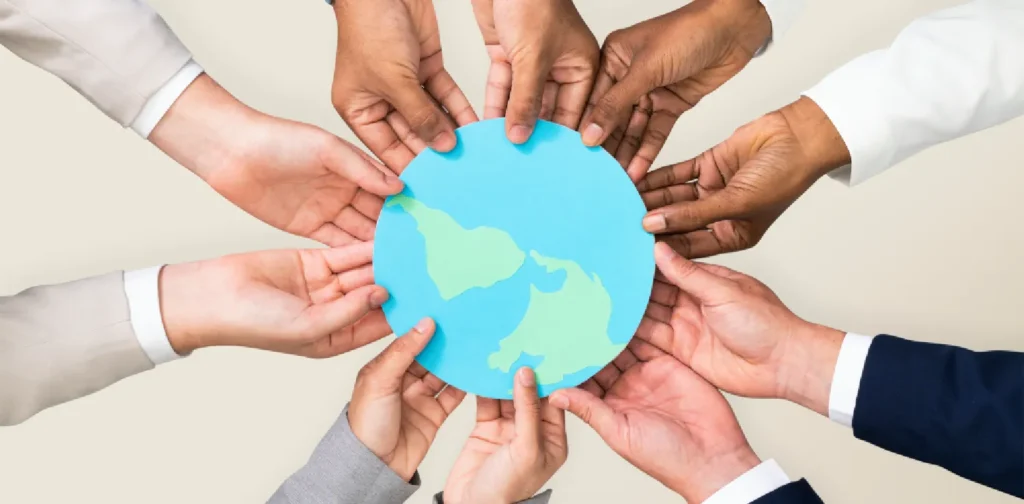Business and Human Rights (BHR) 101: Balancing People and Profit

Photo: rawpixel.com on Freepik
Businesses have an important part of our daily lives, from making the clothes we wear to providing the services we use. Behind all the goods and services, business practices significantly impact people as workers, consumers, and communities . With this context, the Business and Human Rights (BHR) principle becomes an important framework to support fair and inclusive workplaces for the people involved throughout the value chains and business practices.
Human Rights in Business Practices
Businesses play a key role in achieving sustainable development, so it becomes increasingly important to ensure that their actions respect human rights. Yet, for too long, businesses have instead been the culprits in many human rights violation cases, contributing to the inequalities and injustices across the globe.
In this light, BHR emerged as a guiding principle. Essentially, Business and Human Rights (BHR) is a concept where companies have a responsibility to treat people fairly in their operations and throughout their supply chains. This means that business entities must identify, prevent, and address any issues that could harm the human rights of their workers, communities, and consumers. While governments protect universal human rights, businesses are tasked with respecting and upholding them.
The Universal Declaration of Human Rights (UDHR), issued in 1948, forms the foundation of freedom and justice for all, reaffirming that all individuals are born free and equal in dignity and rights. This declaration includes fundamental rights such as the right to decent work, the right to health and safety, freedom of expression and assembly, and the right to fair treatment.
Building on this foundation, the UN Guiding Principles on Business and Human Rights (UNGPs) further define how businesses should operate in a way that respects human rights.
Guiding Principles for Business and Human Rights (BHR)
The global foundation for BHR is based on the UN Guiding Principles on Business and Human Rights (UNGP) issued in 2011. While they are not legally binding, the UNGPs provide a clear guide for states and businesses to follow international human rights standards. There are three main points to the principles:
- Protect – Governments must protect people from human rights abuses in business practices. This means creating laws and systems to prevent and address harm.
- Respect – Businesses must respect human rights in all their operations. They should avoid causing harm and fix any negative impacts they cause.
- Remedy – People who suffer from business-related harm should have access to justice and solutions. This could be through legal action, company grievance systems, or other ways to provide solutions.
Based on this principle, businesses have a duty to respect human rights and avoid actions that harm people. They should not cause or contribute to anything that takes away someone’s ability to enjoy their basic rights. If a company has caused or helped cause real harm, it must provide a solution or remedy. If the harm has not happened yet but is a risk, the company should work to prevent or reduce it as much as possible.
BHR is applicable to all businesses, no matter their size or sector, and help create a shared understanding of human rights responsibility across industries and countries.
Towards Responsible and Rights-Based Business
Turning Business and Human Rights (BHR) principles into real action must go beyond policy implementation. It takes training, regular risk checks, and tools like human rights due diligence (HRDD) to prevent harm. Additionally, strong monitoring and transparency help ensure these efforts are more than just promises.
Therefore, collaboration among stakeholders is key. Governments must enforce the law, while civil society and communities hold businesses accountable. Most importantly, companies need to act responsibly, monitor their entire value chains, listen to their workers and consumers, take accountability, and build trust. Putting people first in the search for profit is not just the right thing; it leads to more sustainable, just, and fair outcomes for all.
Editor: Nazalea Kusuma & Kresentia Madina


 Indian Gig Workers Push Back Against 10-Minute Delivery Service Strain
Indian Gig Workers Push Back Against 10-Minute Delivery Service Strain  Call for Governance: Grassroots Initiatives Look to Scale Efforts to Conserve Depleting Groundwater
Call for Governance: Grassroots Initiatives Look to Scale Efforts to Conserve Depleting Groundwater  Integrating Environment, Climate Change, and Sustainability Issues into Education Systems
Integrating Environment, Climate Change, and Sustainability Issues into Education Systems  Finally Enforced: Understanding the UN High Seas Treaty
Finally Enforced: Understanding the UN High Seas Treaty  Risks and Opportunities of Submarine Communication Cables for Sustainable Development
Risks and Opportunities of Submarine Communication Cables for Sustainable Development  Rising Attacks and Violence Against Land and Environmental Defenders
Rising Attacks and Violence Against Land and Environmental Defenders